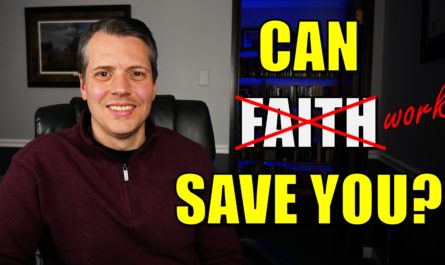This is the seventh post in the “Battle for Your Mind” series. Click here to view the previous post.
THE BATTLE FOR YOUR FAITH
FINDING HOPE IN THE INEVITABLE STORMS
When I was growing up, our neighbors across the street had a ferocious Doberman Pincher named Lucky. I can’t lie to you—I was scared to death of that dog. Whenever I was the unfortunate victim selected to venture out to get the mail, fear would strike my little heart. I would shuffle slowly down the long driveway, constantly on the lookout for the canine that would inevitably charge around the house, barreling straight toward me baring its three-inch slobber-slinging fangs.
I was absolutely petrified of this dog, even though I knew how to stop him in his tracks. I knew that as soon as the dog hit the street, if I yelled, “Go home!” Lucky would stop, turn around, and go back. There was nothing to fear. Still I pictured myself lying there by the mailbox in a pool of blood, my life violently cut short.
It was a danger that did not exist, but I allowed it to paralyze me.
That is exactly what the Devil does to us. He poses a real danger, but he does not have ultimate power over you. He comes out barking and slobbering, and our lack of faith in the power of God causes us to be paralyzed with fear.
We need to remember that our God is bigger than any enemy we have. But that requires faith.
What is faith? How about this for a working definition: Faith is trusting in something outside of yourself even when you cannot understand it.
Faith is obviously required in salvation, but it also helps in your daily life.
To help us understand this matter of faith a little more, let’s look at a true story that allows us to peek in on someone living by faith in a perilous situation.[i]
In the twenty-seventh chapter of Acts, Paul was on his way to Rome. He had gotten into trouble for preaching (again) and appealed to take his case to Caesar (verses 1-8). The ship upon which he was a passenger stopped in Lasea, and because it was late in the year, Paul advised the soldiers and sailors of the ship not to continue on. However, they rejected his advice and left port anyway (verses 9-12).
It wasn’t long before a violent storm kicked up. This is where we begin to relate Paul’s situation into our own lives.
The storms of life should be expected (Verses 13-20)
In verse fourteen, problems began to appear. The smooth sailing they had enjoyed thus far turned to near disaster.
Isn’t that just how it usually is? The soft wind is blowing, the weather is fine, BUT . . .
The storms of life are inevitable. You have no control over when and where they will appear.
What you can control, however, is how you will respond to them. The folks on the ship with Paul reacted in different ways. Let’s observe and see if we respond the same way.
First, they responded with labor. They consulted their playbook and tried everything they could think of. They tried to head the ship into the wind to keep from capsizing. When that proved unsuccessful, they just allowed the ship to be driven along. Eventually they threw all of their cargo overboard, hoping to lighten the ship. Apparently they didn’t care that when they made it to their destination their cargo would be gone. Finally, they jettisoned the tackling of the ship. This was the gear they used when sailing. It makes you wonder how they planned to get back after the storm died down. Could that stuff really be so heavy that it was dangerous to keep it on board?
Unfortunately, nothing was working. The storm was just too violent. They did everything they could do, but it was not enough. So, it was time for plan B.
They responded with despair (verse 20). They just gave up. They had done everything within their power, but the storm was unrelenting. They abandoned all hope.
This is both a dangerous and beneficial place to be. When you realize you are powerless, what do you do? You can just give up, as these folks did, or you can turn to someone who can help. Be warned, though, that this help might just come from an unlikely source.
For these folks, hope came from Paul, the prisoner.
Picture where we are right now. For two weeks the storm has been raging, panic has turned to despair, and the ship continues to rock. Seasoned sailors have been throwing up over the side and everything is soaked, from the top of the mast to the bottom of the ship. As the vessel rocks in the waves, the crew gathers in the soggy hold to await death. All of a sudden Paul shows up, looking like he doesn’t have a care in the world.
While his calm attitude was surprising, his words were even more shocking. In spite of impending death, he told them to cheer up. Why?
Hope in the storm can be found
Paul had endured the same ordeal these others had. They had given up hope. How could he be so calm? What would cause him to react so differently than the others?
The answer is that he had a message from God. Although the ship would be lost, every person on board would live. God had promised him that not only would he make it to Rome to testify before Caesar, but he would be accompanied by everyone on the ship. This simple promise was enough for Paul.
Paul was able to have faith because he knew what God had said and he believed God.
Faith is the source of hope
While you may not have a promise that you will live another day or be healed from your disease, you do have the promise that God knows what is going on and cares about you. You know that it will be better one day. You know that God is in control and is taking care of you, even when the situation looks bleak.
Wherefore, if God so clothe the grass of the field, which to day is, and tomorrow is cast into the oven, shall he not much more clothe you, O ye of little faith? (Matthew 6:30)
Paul could be calm in the storm because he realized the incredible power of God that can do what we do not understand.
How would God save every person who was on the ship? Paul did not have an answer for that. But he didn’t need one. God said it, and that’s all that matters. That is faith.
Click here for the next section: The Battle for Your Faith: How to Develop Faith.
[i] I am indebted to Dr. Roger Lehman for sharing his general interpretation of this passage.




